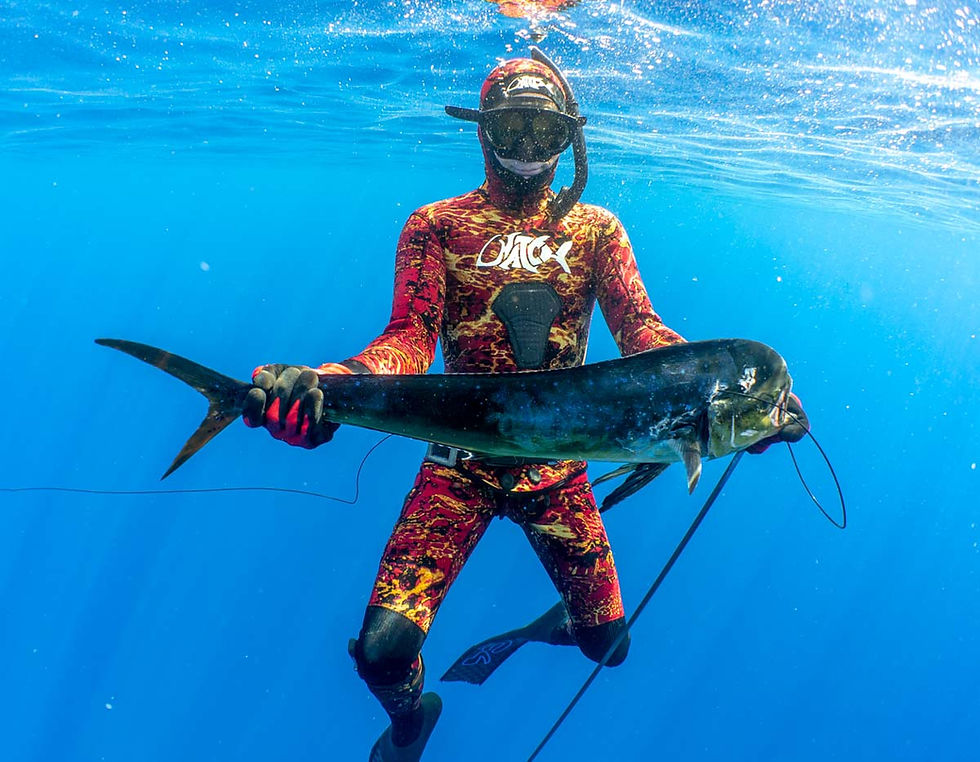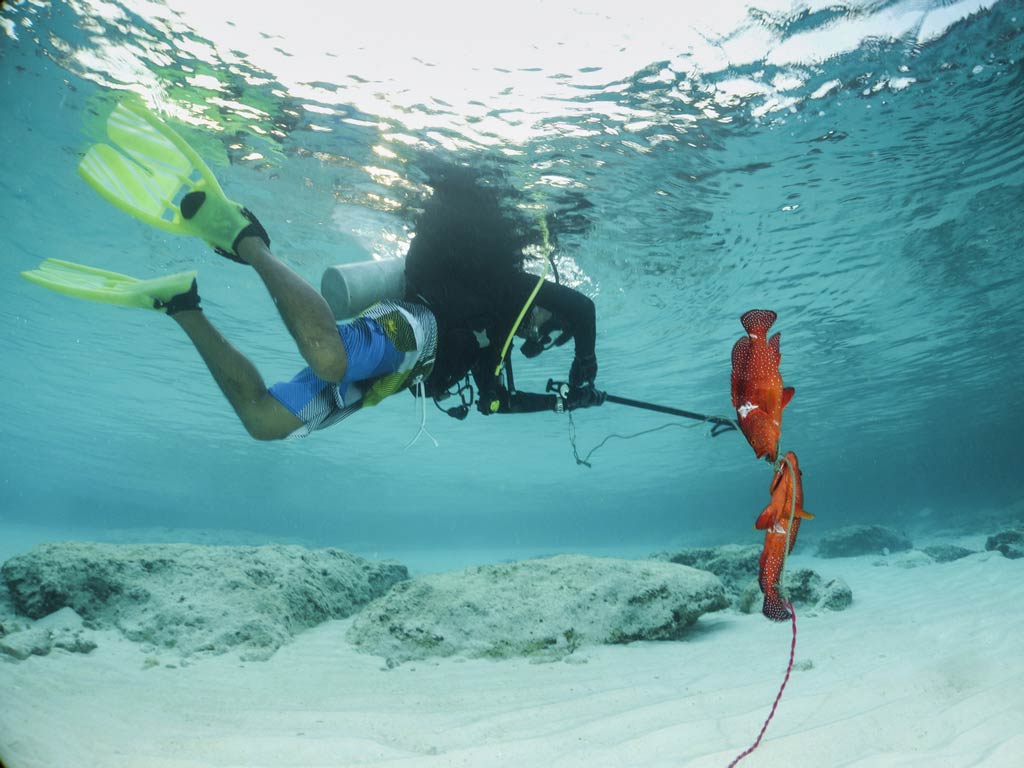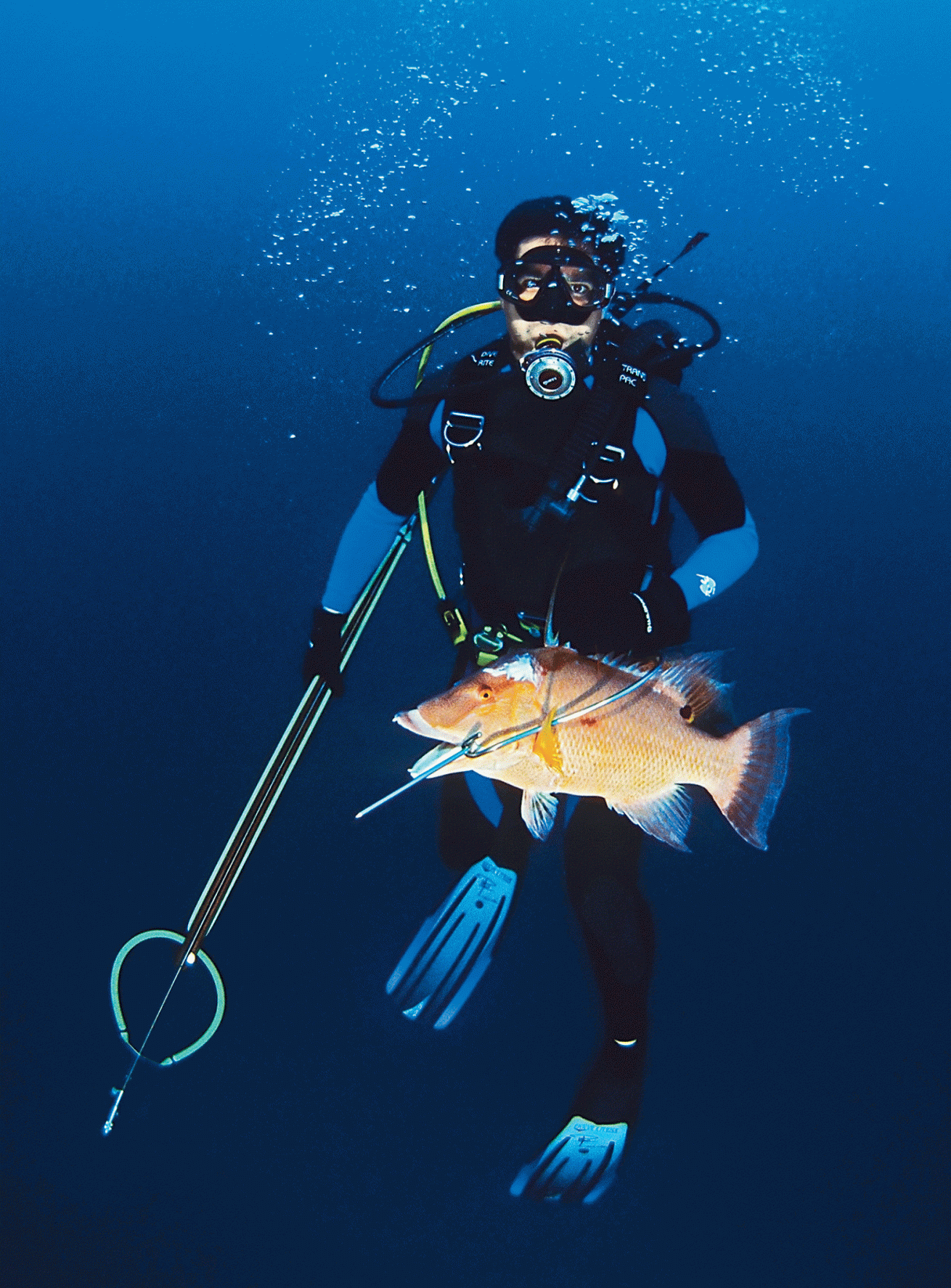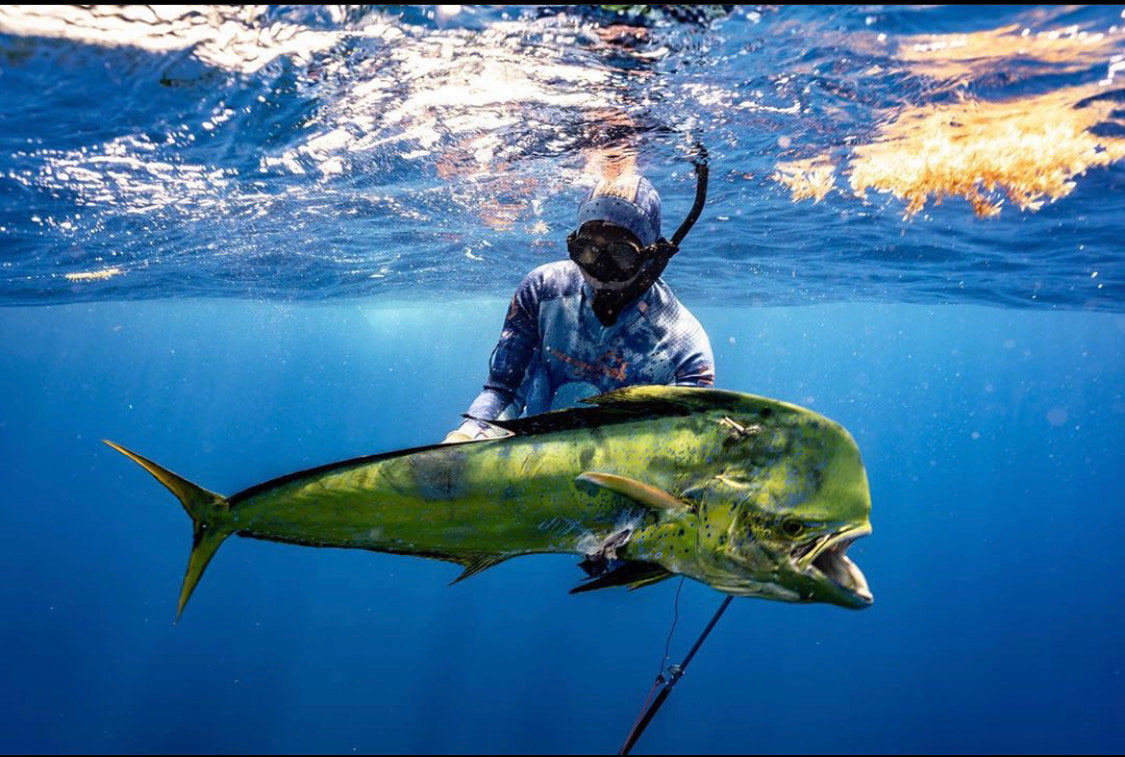Spear fishing is a time-honored method of catching fish that dates back thousands of years, connecting modern enthusiasts to ancient traditions. This practice, blending skill, patience, and an intimate understanding of underwater environments, offers both recreational and sustenance opportunities. Consequently, understanding the different techniques, equipment, and safety measures involved in spear fishing can enhance your experience and ensure responsible fishing practices. Therefore, this comprehensive guide explores the definition of spear fishing, various methods, essential equipment, and important safety tips. By delving into these aspects, you can gain a deeper appreciation for spear fishing and approach this ancient practice with confidence and respect.
Understanding Spear Fishing
Spear fishing is more than just a way to catch fish; it is an immersive experience requiring skill, patience, and knowledge of the underwater world. Understanding the basics of spear fishing helps in appreciating its complexity and allure. Therefore, exploring what spear fishing entails and its historical significance is essential.
Definition and Techniques
Spear fishing is the practice of hunting fish using a spear or a spear-like implement, often while free diving or snorkeling. This method involves approaching fish stealthily and targeting them with precise, controlled movements. Techniques can vary based on environment and target species, including free diving, where the fisherman dives without breathing apparatus, and spearfishing with scuba gear, which allows for longer underwater stays. Each technique requires different skill sets and equipment, making spear fishing a diverse and versatile practice. Therefore, understanding the definition and techniques of spear fishing is foundational.
Historical Significance
Spear fishing has deep historical roots, tracing back to early human civilizations. Archaeological evidence shows that ancient cultures used spears and harpoons to catch fish in both freshwater and marine environments. This practice provided a critical food source and played a vital role in survival and community sustenance. As a testament to its effectiveness, spear fishing methods have evolved while retaining their core principles. Modern enthusiasts continue to draw inspiration from these ancient techniques, blending tradition with contemporary equipment. By recognizing its historical significance, we can appreciate spear fishing’s rich heritage and enduring appeal. Therefore, understanding the historical context adds depth to the practice of spear fishing.
Methods of Spear Fishing
Spear fishing encompasses various methods, each suited to different environments and fishing conditions. Understanding these methods allows you to choose the one that best fits your interests and skill level. Therefore, exploring the methods of spear fishing is crucial for informed decision-making.
Free Diving Spear Fishing
Free diving spear fishing involves diving underwater without the use of breathing apparatus, relying on breath-hold techniques. This method requires a strong understanding of breath control, buoyancy, and underwater hunting skills. Free divers often use fins, masks, and snorkels to enhance mobility and visibility. Stealth and patience are key, as approaching fish without startling them can be challenging. Free diving spear fishing offers a deep connection to the underwater environment, providing an exhilarating and immersive experience. Therefore, free diving spear fishing is an appealing method for those seeking a primal and intimate fishing experience.
Scuba Diving Spear Fishing
Scuba diving spear fishing allows divers to stay underwater for extended periods using a self-contained underwater breathing apparatus (scuba). This method provides more time to observe and target fish, making it suitable for deeper and more challenging environments. Scuba divers use specialized spear guns or pole spears to catch fish, adapting their techniques to the underwater conditions. While scuba diving can offer more opportunities, it requires proper training and certification to ensure safety. By combining the benefits of scuba diving with spear fishing, enthusiasts can explore new depths and species. Therefore, scuba diving spear fishing is ideal for those seeking a comprehensive underwater adventure.
Essential Equipment for Spear Fishing
Having the right equipment is essential for a successful and safe spear fishing experience. Understanding the necessary gear ensures you are well-prepared for various conditions and environments. Therefore, exploring the essential equipment for spear fishing is crucial for effective and responsible practice.
Spear Guns and Pole Spears
Spear guns and pole spears are the primary tools used in spear fishing, each offering unique advantages. Spear guns come in various types, including pneumatic, band-powered, and rail guns, providing powerful and accurate shots. They are suited for targeting larger fish and deeper waters. Pole spears, on the other hand, are simpler and more traditional, consisting of a long shaft with a sharp tip. They offer versatility and ease of use, making them ideal for beginners and shallow water fishing. Choosing the right spear gun or pole spear depends on your skill level, target species, and fishing environment. Therefore, investing in high-quality spear guns or pole spears is essential.
Masks, Fins, and Snorkels
Masks, fins, and snorkels are fundamental equipment for enhancing underwater visibility and mobility. A well-fitting mask provides a clear view of the underwater environment, helping you spot and target fish more effectively. Fins enhance your swimming efficiency, enabling you to move swiftly and conserve energy while diving. Snorkels allow you to breathe comfortably at the surface, preparing you for dives and improving overall breath control. When selecting these items, prioritize comfort, fit, and durability to enhance your spear fishing experience. Therefore, having reliable masks, fins, and snorkels is crucial for effective underwater exploration.
Safety Tips for Spear Fishing
Safety is paramount in spear fishing, given the inherent risks of underwater environments and handling sharp equipment. Understanding and adhering to safety guidelines ensures a responsible and enjoyable experience. Therefore, exploring safety tips for spear fishing is essential for protecting yourself and the environment.
Dive with a Buddy
Diving with a buddy is a fundamental safety practice in spear fishing. Having a partner ensures you have immediate assistance in case of emergencies, such as shallow water blackout or equipment failure. Communication and coordination with your buddy are key, including establishing clear signals and staying within close proximity. A buddy can provide support, share observations, and enhance the overall safety and enjoyment of your dive. Therefore, always diving with a buddy is a critical safety tip for spear fishing.
Know Your Limits
Understanding and respecting your limits is crucial for a safe and sustainable spear fishing experience. Avoid pushing yourself beyond your comfort and skill levels, whether in terms of depth, duration, or target species. Gradually build your skills through practice and training, and always listen to your body. If you feel fatigued or unwell, take appropriate breaks and avoid risky situations. Recognizing and respecting your limits prevents accidents and promotes long-term enjoyment of the sport. Therefore, knowing your limits is an essential safety practice in spear fishing.
Environmental Responsibility in Spear Fishing
Spear fishing, like any fishing activity, impacts marine ecosystems. Practicing environmental responsibility ensures the sustainability of fish populations and the protection of underwater habitats. Understanding these responsibilities enhances your role as a conscientious angler. Therefore, exploring environmental responsibility in spear fishing is essential for ethical practice.
Target Sustainable Species
Selecting sustainable species is a key aspect of responsible spear fishing. Avoid targeting overfished or endangered species and focus on abundant, stable populations. Research local regulations and guidelines to understand which species are permissible to catch and in what quantities. By targeting sustainable species, you contribute to the health and balance of marine ecosystems. Additionally, practicing selective fishing by avoiding undersized or breeding fish promotes long-term sustainability. Therefore, targeting sustainable species is a vital practice in environmentally conscious spear fishing.
Avoiding Damage to Habitats
Protecting underwater habitats is crucial for maintaining the ecological balance and supporting diverse marine life. Avoid disturbing coral reefs, seagrass beds, and other sensitive areas during your dives. Be mindful of your movements and equipment to prevent physical damage to these habitats. Properly anchoring your boat and avoiding dragging gear along the ocean floor minimizes the impact on the environment. By practicing careful and respectful diving, you help preserve the beauty and integrity of underwater ecosystems. Therefore, avoiding damage to habitats is an essential principle in responsible spear fishing.
Common Misconceptions About Spear Fishing
Addressing common misconceptions about spear fishing provides clarity and fosters a better understanding of its practices and benefits. Dispelling these myths helps in promoting responsible and informed participation. Therefore, exploring common misconceptions is important for accurate appreciation.
Misconception: Spear Fishing Is Cruel
A common misconception is that spearfishing is inherently cruel or harmful to fish. In reality, spearfishing promotes selective and targeted fishing, often resulting in less bycatch and waste than other methods. When practiced responsibly, it allows for quick and humane captures, reducing stress and suffering for the fish. Additionally, the focus on sustainable species and proper techniques contributes to the overall health of marine populations. By promoting these practices, spearfishing can be a more ethical and sustainable way to catch fish. Therefore, recognizing the ethical potential of spearfishing dispels the notion of inherent cruelty.
Misconception: Spear Fishing Is Easy
Another misconception is that spearfishing is an easy and effortless way to catch fish. In truth, spearfishing requires significant skill, patience, and physical endurance. Mastering techniques such as breath control, underwater hunting, and precise shooting takes time and practice. Additionally, the challenges of navigating underwater environments and understanding fish behavior add to the complexity. By acknowledging the effort and expertise involved, we can appreciate the dedication required for successful spearfishing. Therefore, understanding the challenges of spearfishing dispels the myth of it being easy.
Conclusion: Embracing the Art of Spear Fishing
Spearfishing is a captivating and ancient practice that offers a unique blend of skill, patience, and connection to the underwater world. Understanding the definition, techniques, and historical significance provides valuable context for appreciating its depth.
Exploring the various methods, including free diving and scuba diving spearfishing, allows you to choose the one that aligns with your interests and skill level. Essential equipment such as spear guns, pole spears, masks, fins, and snorkels ensures a safe and effective practice.
Adhering to safety tips, such as diving with a buddy and knowing your limits, enhances your overall experience and protects your well-being. Practicing environmental responsibility by targeting sustainable species and avoiding habitat damage promotes ethical and sustainable fishing practices.
Addressing common misconceptions provides clarity and fosters a better understanding of the true nature and benefits of spearfishing. By embracing these aspects, you can approach spearfishing with confidence, respect, and responsibility.
Therefore, whether you are a novice or an experienced angler, spearfishing offers an immersive and rewarding way to connect with nature and enjoy the sport of fishing. Enjoy the adventure and excitement that spearfishing brings, and dive into the underwater world with skill and respect!





